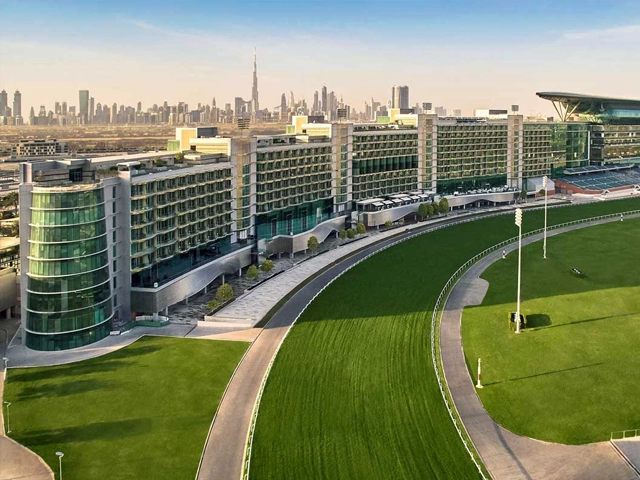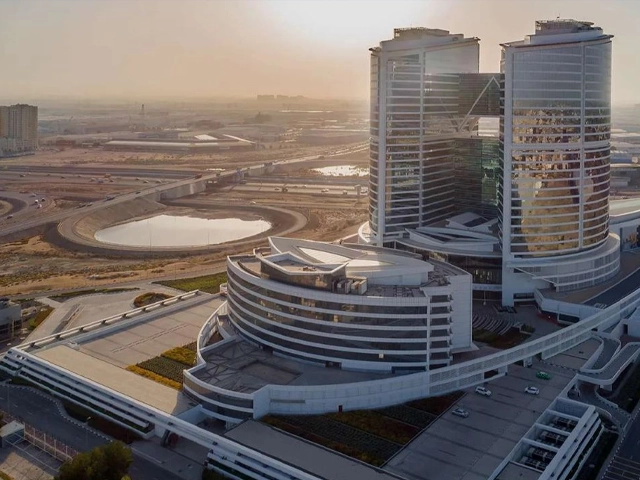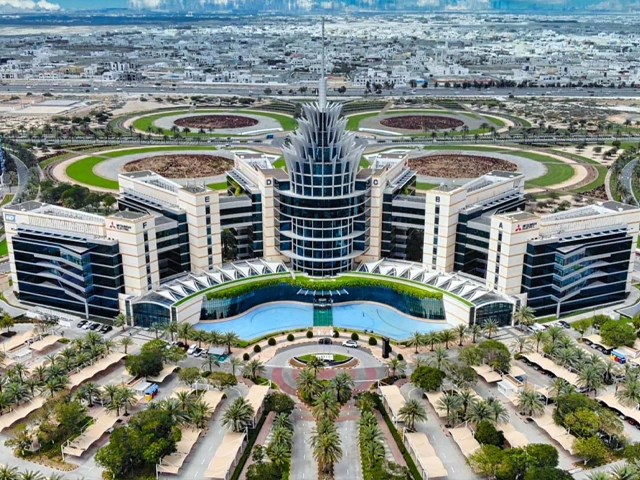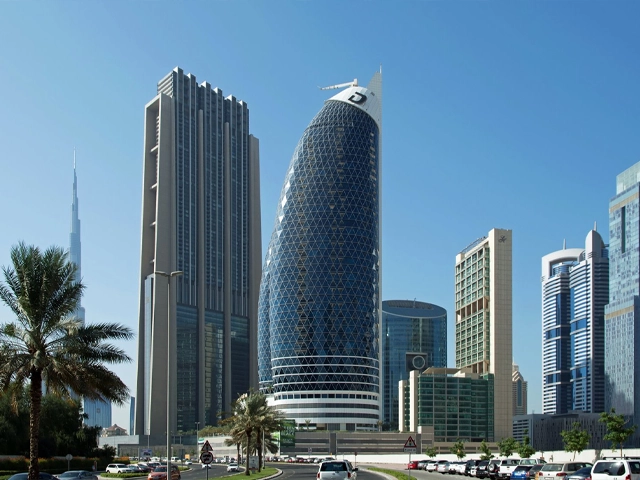Step-①: Obtain an employment entry visa in the UAE
1. Apply for an entry visa quota approval
If the applicant resides and works in one of the UAE’s 46 free zones, the employer must apply for a UAE free zone visa, which requires visa quota approval from the Ministry of Labor.
Free zone employers have a quota restriction on work visas, which vary across free zones. For example, the quota in Dubai is one visa per nine square meters of office space. If an employer reaches their quota, they can move to a larger office or apply for a quota upgrade.
2. Submit a signed employment contract
Upon receiving quota approval, the employer must submit a signed work contract to the MoL for approval. The contract must be in English, Arabic, and the employee’s native language if it differs from either language.
3. Submit a work visa application and apply for an entry visa
The employer must submit their work visa application for approval. At this stage, the MoL confirms that the sponsor is a registered UAE corporate entity and determines if any unemployed UAE citizens can fill the vacant position instead of the foreign applicant. The MoL must approve the work visa application before issuing an entry visa.
4. Receive an employment entry visa
Upon approval of the work visa application, the MoL issues an employment entry visa, also called a pink visa. The entry visa is valid for two months for standard and Green visa holders and six months with multiple entries for Golden visa holders. It allows the employee to legally enter the UAE to formalize their work visa and apply for a residence visa.
The employee receives the entry visa once they arrive in the UAE. If they can’t travel to the UAE within 60 days, they can apply for a one-time extension. If the employee is already in Dubai or the UAE on a different visa, they should apply for a visa “change of status” or do a “border run” to get the entry visa.
Upon entry, the employee should start collecting supporting documents for their residence visa application, such as an Emirates ID and health certificate, while the employer submits additional supporting documents for the work visa.
Step-②: Apply for an Emirates ID
5. Apply for an Emirates ID
Foreign nationals entering or relocating to the UAE for work must get an Emirates ID, which is necessary for the required medical screening. The ID directly links to the expat’s residence visa and serves as an everyday identification document in the UAE in place of a passport.
To apply for an Emirates ID, the employee must visit an Emirates Identity Authority (EIDA) center with their passport and entry visa and provide biometrics, such as their fingerprints and a photograph.
.
Step-③:Obtain a work visa and residence visa in the UAE
6. Get a medical checkup
All applicants must receive medical screening at a government-approved clinic in the UAE. The results of the checkup are required for the residence visa application.
7. Submit a labor contract
As a part of the UAE work visa formalization, employers must upload their employee’s labor contract to the MoL website within 14 days of receiving the employee’s medical screening results.
8. Get health insurance
Health insurance is mandatory for all expat employees in the UAE. In some Emirates, such as Abu Dhabi and Dubai, employers must provide health insurance for employees and their families.
If a foreign employee resides in Sharjah or one of the northern Emirates, they must purchase their own health insurance plan. The MoL does not issue or renew work visas for employees without a valid health insurance card.
9. Receive a work visa and begin payroll
After completing the above steps, it takes about five days for the MoL to grant an official work visa. Upon receiving the work visa, employees can legally begin working in the UAE, and employers can start administering payroll through the official UAE system.
10. Receive a residence visa
Once all of the above items are in place, the employee must submit the required documents with their application for a residence visa. If the applicant hasn’t received their official Emirates ID, an application receipt will suffice. The residence visa is valid for two years and is renewable.
All expats need a residence visa to live in the UAE, and the MoL lists the employee’s work visa as part of the residence visa. Expats also need a residence visa for completing formalities, such as opening bank accounts, registering a car, and opening a PO box.
Step-①: Procuring an Employment Entry Visa in the UAE
- Application for an Entry Visa Quota Approval
- Should the applicant reside and be employed within one of the UAE’s 46 free zones, the employer is required to submit an application for a UAE free zone visa, which necessitates visa quota approval from the Ministry of Labor (MoL). Free zone employers are subject to quota restrictions on work visas, which vary among the free zones. For instance, the quota in Dubai is set at one visa per nine square meters of office space. If an employer reaches their allocated quota, they may opt to relocate to a larger office space or apply for a quota upgrade.
- Submission of a Signed Employment Contract Upon receipt of quota approval, the employer must submit a signed work contract to the MoL for endorsement. The contract is required to be presented in English, Arabic, and the employee’s native language if it differs from either of the aforementioned languages.
- Submission of a Work Visa Application and Application for an Entry Visa The employer must submit their work visa application for approval. At this juncture, the MoL confirms that the sponsoring entity is a registered UAE corporate entity and assesses whether any unemployed UAE citizens can fill the vacant position instead of the foreign applicant. The MoL’s approval of the work visa application is a prerequisite for the issuance of an entry visa.
- Receipt of an Employment Entry Visa Following approval of the work visa application, the MoL issues an employment entry visa, also known as a pink visa. This entry visa is valid for two months for standard and Green visa holders, and for six months with multiple entries for Golden visa holders. It authorizes the employee to legally enter the UAE for the purpose of formalizing their work visa and applying for a residence visa. The employee receives the entry visa upon their arrival in the UAE. If they are unable to travel to the UAE within 60 days, they may apply for a one-time extension. Should the employee already be present in Dubai or the UAE on a different visa, they are required to apply for a visa “change of status” or undertake a “border run” to obtain the entry visa. Upon entry, the employee should commence the collection of supporting documents for their residence visa application, such as an Emirates ID and health certificate, concurrently with the employer’s submission of additional supporting documents for the work visa.
Step-②: Application for an Emirates ID5. Application for an Emirates ID
Foreign nationals entering or relocating to the UAE for employment purposes are mandated to obtain an Emirates ID, which is essential for the required medical screening. The ID is directly linked to the expatriate’s residence visa and serves as a primary identification document within the UAE, in lieu of a passport.
To apply for an Emirates ID, the employee must visit an Emirates Identity Authority (EIDA) center with their passport and entry visa and provide biometrics, including fingerprints and a photograph.
.
Step-③: Obtaining a Work Visa and Residence Visa in the UAE6. Completion of a Medical Checkup
All applicants are required to undergo medical screening at a government-approved clinic in the UAE. The results of this checkup are a mandatory component of the residence visa application.
- Submission of a Labor Contract
As part of the formalization of the UAE work visa, employers must upload their employee’s labor contract to the MoL website within 14 days of receiving the employee’s medical screening results.
- Procurement of Health Insurance
Health insurance is compulsory for all expatriate employees in the UAE. In certain Emirates, such as Abu Dhabi and Dubai, employers are obligated to provide health insurance for employees and their families.
If a foreign employee resides in Sharjah or one of the northern Emirates, they are responsible for purchasing their own health insurance plan. The MoL will not issue or renew work visas for employees who do not possess a valid health insurance card.
- Receipt of a Work Visa and Commencement of Payroll
Following the completion of the aforementioned steps, it typically takes approximately five days for the MoL to grant an official work visa. Upon receiving the work visa, employees are legally permitted to commence employment in the UAE, and employers can initiate payroll administration through the official UAE system.
- Receipt of a Residence Visa
Once all the preceding requirements are fulfilled, the employee must submit the necessary documents with their application for a residence visa. If the applicant has not yet received their official Emirates ID, an application receipt will suffice. The residence visa is valid for two years and is renewable.
All expatriates require a residence visa to reside in the UAE, and the MoL includes the employee’s work visa as a component of the residence visa. Expatriates also necessitate a residence visa for completing formalities such as opening bank accounts, registering a vehicle, and establishing a post office box.










